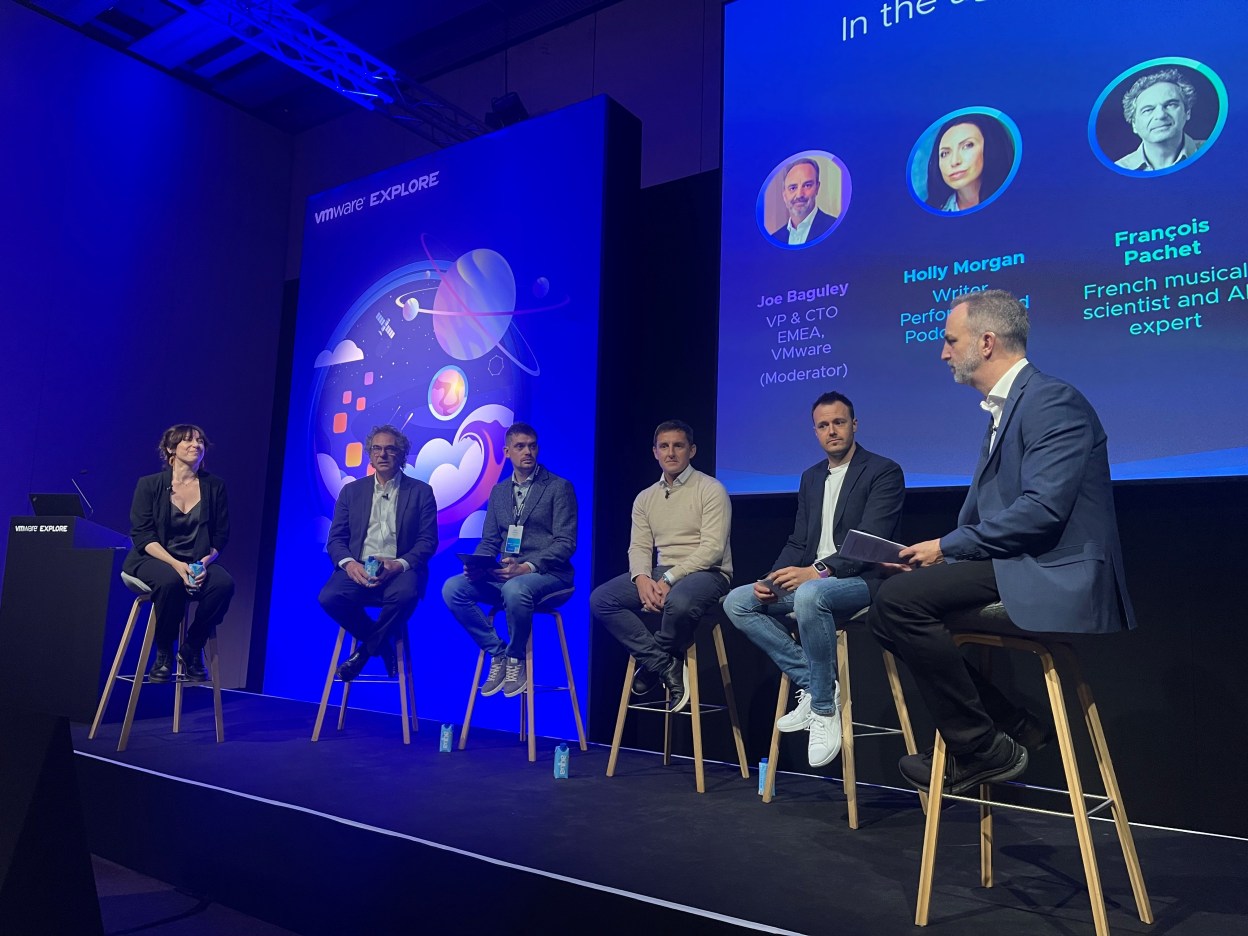The technology revolution is a continuum, presenting new and emerging developments that often have a lasting impact on industries such as education, entertainment, science and healthcare. Artificial intelligence (AI) is one of the latest of such innovations, having brought with it seemingly equal parts of excitement and concern.
To have an open discussion on how we can co-exist with AI, we convened a panel of experts at VMware Explore Barcelona aimed to shed light on how they’re leveraging it, whether or not their respective sectors stand to benefit from it and what they believe to be the next frontier for the technology.
Joe Baguley, VP and EMEA CTO, VMware, hosted the discussion with Rich Buchanan, Holly Morgan, François Pachet, Egoitz Etxeandia and Dario Canella. Here’s a summary of the key discussion points:
When it comes to well-defined tasks, AI can do it better than humans. But it has no idea whether what it makes is interesting or not.
François Pachet, musical scientist and AI expert
Having spent decades teaching machines to learn to produce music, François believes that artificial intelligence is comparable to the invention of electricity or combustible engines. “Generative AI such as ChatGPT is just the latest development of the technology,” he said. “The issue with AI is that a lot of people fear it because we’re bad at explaining what it does.”
In recent months, AI-generated music has become a controversial topic due to copyright concerns after several notable examples of AI being used to mimic popular artists such as Drake and The Weeknd. However, François notes that this was not the first time the use of technology caused concern within the music industry.
“In the 1980’s, when synthesizers and digital samplers were invented, people said it was the end of musicians and were very resistant to adopting them at the time. However, history has shared what happened was quite the opposite – thanks to technology, we now have more music than ever.”
“There is no fear that there will be fewer musicians,” François mentioned. “People who do music-related research in AI are driven by a positive vision of making better and more interesting music that contains unheard of melodies and harmonies.”
Those who harmonise ‘what has always been done’ with new innovations tend to succeed.
Rich Buchanan, Performance Director, Zone7
From a sports perspective, Rich highlighted that there has been a revolution and explosion of data provided by wearables worn by athletes during match days and training. This has, in his experience, created a ‘data swamp’, which people from non-data backgrounds are now struggling to navigate.
Zone7 supports its customers by providing what they call as ‘human uptime’ by helping those operating in the coaching space to assess injury risk to players based on both collected and real-time data. This data is then used by coaching staff to inform player availability ahead of matchdays.
“AI can help get to the ‘why’, but it can’t give you direction,” Rich noted. “Many want data to give them concrete answers, but this is not the case as you need to use your own skills to interpret it.”
Rich believes that because of this, the next step for Generative AI tools such as ChatGPT would be to create responses based on your personal information, which would ideally yield more hyper-personalized results for questions involving health and fitness.
AI is nothing to be afraid of – the more we understand it, the less we’ll fear it
Holly Morgan, comedian, presenter and podcast host
As a comedian and host of the Big Diva Energy, Holly uses AI to create the basis of each podcast episode. “Time management is not something people are inherently good at,” she shared. “I think the next frontier for AI is helping organise my time and enable me to spend more time doing the things that matter.”
For Holly, AI is a tool that should be used to enable creativity instead of trying to replace it. “With my scriptwriting, I use AI to liberate my time – I create a spine or skeleton of a script, then fill in all the rest of it,” Holly said.
“You can teach ChatGPT to write you an episode for a sitcom, but it probably won’t result in anything you would want to watch. Instead, you can use it to feed you some ideas that you can build upon with your own personal ideas and anecdotes – that’s what makes people laugh.”
We should focus on using AI for inventing rather than replacing.
Egoitz Etxeandia, founder of AIEDUTECH
From an education point of view, Egoitz noted that AI can help teachers have a greater impact on their students’ behavior by allowing them to spend more meaningful quality time understanding their individual needs.
“I don't really think that technology or AI will be able to fully replace humans or teachers in education. Machines will never be able to replace human emotions and human centric processes on education and work,” he shared. “We should focus on using AI for inventing rather than replacing.”
The next frontier in healthcare is an integration of AI/ML with augmented reality.
Dario Canella, Healthcare and Diagnostic Lead, Engineering
In the healthcare sector, Dario has noticed great benefits with the introduction of AI, including more efficient diagnoses, which in turn enables faster treatment.
“I believe that the next frontier would be an integration between AI algorithms and augmented reality (AR). At Engineering, we are working on a project that aims to create a system that can aid pathologists and clinicians in real time in laboratories or surgical procedures.” he shared. “This kind of system can help professionals identify specific tissue structures and reduce the time needed to do so.”

